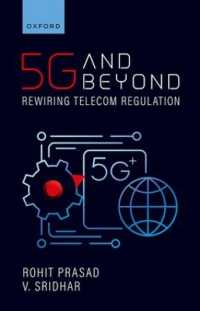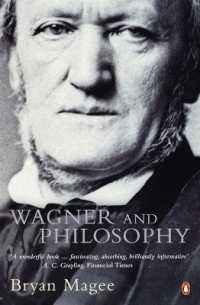- ホーム
- > 洋書
- > 英文書
- > Philosophy
Full Description
Brian Leftow offers a theory of the possible and the necessary in which God plays the chief role, and a new sort of argument for God's existence. It has become usual to say that a proposition is possible just in case it is true in some 'possible world' (roughly, some complete history a universe might have) and necessary just if it is true in all. Thus much discussion of possibility and necessity since the 1960s has focussed on the nature and existence (or not) of possible worlds. God and Necessity holds that there are no such things, nor any sort of abstract entity. It assigns the metaphysical 'work' such items usually do to God and events in God's mind, and reduces 'broadly logical' modalities to causal modalities, replacing possible worlds in the semantics of modal logic with God and His mental events. Leftow argues that theists are committed to theist modal theories, and that the merits of a theist modal theory provide an argument for God's existence. Historically, almost all theist modal theories base all necessary truth on God's nature. Leftow disagrees: he argues that necessary truths about possible creatures and kinds of creatures are due ultimately to God's unconstrained imagination and choice. On his theory, it is in no sense part of the nature of God that normal zebras have stripes (if that is a necessary truth). Stripy zebras are simply things God thought up, and they have the nature they do simply because that is how God thought of them. Thus Leftow's essay in metaphysics takes a half-step toward Descartes' view of modal truth, and presents a compelling theist theory of necessity and possibility.
Contents
Introduction ; 1. Modal Basics ; 2. Some Solutions ; 3. Theist Solutions ; 4. The Ontology of Possibility ; 5. Modal Truthmakers ; 6. Modality and the Divine Nature ; 7. Deity as Essential ; 8. Against Deity Theories ; 9. The Role of Deity ; 10. The Biggest Bang ; 11. Divine Concepts ; 12. Concepts, Syntax, and Actualism ; 13. Modality: Basic Notions ; 14. The Genesis of Secular Modality ; 15. Modal Reality ; 16. Essences ; 17. Non-Secular Modalities ; 18. Theism and Modal Semantics ; 19. Freedom, Preference, and Cost ; 20. Explaining Modal Status ; 21. Explaining the Necessary ; 22. Against Theistic Platonism ; 23. Worlds and the Existence of God ; Bibliography ; Index








